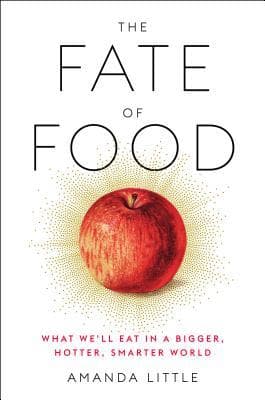
Book Review Summary: The Fate of Food: What We'll Eat in a Bigger, Hotter, Smarter World
Introduction
"The Fate of Food: What We'll Eat in a Bigger, Hotter, Smarter World" by Amanda Little is a captivating exploration of the sustainable food revolution. Little, an environmental journalist and professor, delves into the future of food and the challenges it faces in the face of climate change, population growth, and environmental degradation. Through her travels and interviews with farmers, scientists, activists, and engineers, she sheds light on innovative approaches to food production and the potential solutions that could reshape the global food system. In this article, we will delve into the book's main themes, analyze readers' opinions, and provide reasons for both recommending and not recommending this thought-provoking work.
About Amanda Little
Amanda Little, the author of "The Fate of Food," is a professor of journalism and Writer-in-Residence at Vanderbilt University. With a background in energy, technology, and the environment, Little brings a wealth of knowledge and experience to her writing. Her reporting has taken her to remote locations and behind the scenes of various industries, allowing her to uncover the complexities and challenges facing our world today. Through her work, Little seeks to inspire readers with her passion for sustainability and her ability to convey complex ideas in an accessible manner.
Analysis of Views
- Innovative Approaches to Food Production: Readers were impressed by Little's exploration of cutting-edge technology and innovative farming methods. They appreciated the insights into new ways of growing food, such as robotics and vertical farming, and found them both informative and thought-provoking.
- Addressing Misconceptions: The book challenged readers' preconceived notions about certain food practices, such as GMOs. Little provided a balanced perspective on their potential benefits and drawbacks, challenging readers to reconsider their beliefs.
- Climate Change Impact: Many readers found the book's exploration of climate change's impact on food production particularly compelling. They appreciated Little's examination of how global warming affects crop production, water resources, and food security.
- Hopeful Optimism: Despite the book's focus on pressing challenges, readers appreciated Little's optimistic tone. They found her insights into human ingenuity and resilience inspiring, particularly in the face of daunting environmental obstacles.
- Engaging Writing Style: Little's writing style was praised for its accessibility and conversational tone. Readers found her narrative engaging and enjoyable, making it easier to grasp complex concepts related to food production and sustainability.
Reasons for Recommendation
- Informative Content: Readers found the book to be a valuable source of information on the future of food production and the challenges it faces. They appreciated Little's thorough research and ability to present complex ideas in an understandable manner.
- Thought-Provoking Perspectives: The book encouraged readers to reconsider their beliefs about food production and explore new perspectives. They appreciated Little's ability to challenge conventional wisdom and offer alternative viewpoints on topics such as GMOs and sustainable agriculture.
- Engaging Storytelling: Little's storytelling skills were praised for their ability to bring the subject matter to life. Readers found themselves captivated by her personal experiences and interviews with farmers, scientists, and activists from around the world.
Reasons for Not Recommendation
- Lack of Focus on Health Aspects: Some readers felt that the book did not delve deeply enough into the health implications of certain food practices or technologies. They wished for a more comprehensive exploration of how these changes might impact human health in the long term.
- Tone: A few readers found Little's tone to be overly optimistic or dismissive of certain concerns related to food production. They felt that she downplayed the potential risks associated with some technologies or practices, which detracted from their overall experience reading the book.
Conclusion
"The Fate of Food: What We'll Eat in a Bigger, Hotter, Smarter World" by Amanda Little is a thought-provoking exploration of the future of food production and its challenges in a rapidly changing world. Through her engaging storytelling and thorough research, Little offers readers a comprehensive look at innovative approaches to food production and the potential solutions that could reshape the global food system. While some readers found the book lacking in depth on certain health aspects or felt that Little's tone was overly optimistic, overall it received positive reviews for its informative content and thought-provoking perspectives. Whether you are interested in sustainability, food production, or simply curious about the future of our planet's food supply, "The Fate of Food" is a must-read for anyone seeking a deeper understanding of these pressing issues.